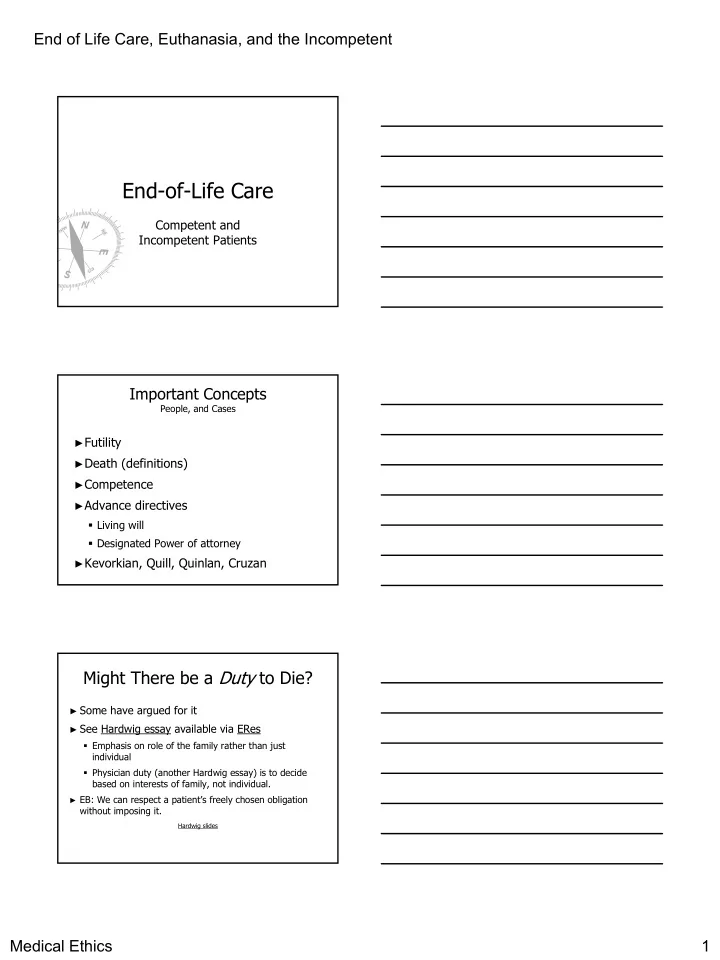

End of Life Care, Euthanasia, and the Incompetent End-of-Life Care Competent and Incompetent Patients Important Concepts People, and Cases ► Futility ► Death (definitions) ► Competence ► Advance directives � Living will � Designated Power of attorney ► Kevorkian, Quill, Quinlan, Cruzan Might There be a Duty to Die? ► Some have argued for it ► See Hardwig essay available via ERes � Emphasis on role of the family rather than just individual � Physician duty (another Hardwig essay) is to decide based on interests of family, not individual. ► EB: We can respect a patient’s freely chosen obligation without imposing it. Hardwig slides Medical Ethics 1
End of Life Care, Euthanasia, and the Incompetent Technology and Ethics ► On many issues, big divide between those who embrace technology as cure and those who are cautious and fear its results. ► Technology doesn’t answer ethical questions, but it raises new ones. ► Most obvious: cloning, stem cells, genetic engineering, etc. ► Also true of euthanasia: we can keep people alive who would have died years ago. ► Question gets raised: to what lengths should we go to extend life? When is life not worth extending? Can We End Life Earlier Without Euthanasia? ► If treatment is futile . ► If patient can be pronounced dead; i.e., if we change the definition of death so that it includes patients previously considered alive. Concept of Futility ► Controversy over meaning of futility . � Physiological futility: impossible to perform the procedure (e.g., feeding tube cannot be inserted or nutrition cannot be absorbed even with it.) � Futility in terms of survival or conscious life � Futility in terms of survival with a meaningful conscious life. ► Argument: should not be used if real issue is quality of life or wise use of scarce resources Medical Ethics 2
End of Life Care, Euthanasia, and the Incompetent Concept of Death ► Older, traditional view: death defined cessation of heartbeat, breathing. ► Now: brain death (“whole brain death”) ► Definition of death is an ethical issue, not a purely medical one. Why? ► Some want to go further: “higher brain death” ► Persistent vegetative state (“PVS”) and anencephalic infants are not dead. Arguments in favor of Voluntary Active Euthanasia ► It relieves unnecessary suffering ► It allows the exercise of a competent patient’s autonomy (freedom, self-determination) ► It is not morally different from what we appropriately permit now (withdrawal of life- sustaining treatment) ► It saves resources better used elsewhere Arguments Against Voluntary Active Euthanasia ► There is a fundamental moral difference between acting with an intent to kill and not providing life- sustaining treatment and… ► Killing innocent people is always wrong. ► It goes against the human natural tendency to live. (Gay-Williams) ► It will lead doctors (slippery slope) not to work as hard to preserve life (consequentialist) ► It contradicts the purpose of the medical profession (nonconsequentialist) ► Such a policy will put pressure on patients to choose to die even when they want to live. Medical Ethics 3
End of Life Care, Euthanasia, and the Incompetent What If Patient is Not Competent? Two key obligations ► Respect freedom (autonomy) of competent patients to control their own medical care* ► Protect incompetent and vulnerable patients from the consequences of their own harmful choices. ________________ *What’s so important about autonomy? Autonomy as “Crowning Concept” of Bioethics ► Debatable, but basic to bioethical thinking. Why? ► Every medical decision has a factual and an ethical component. ► Doctors (and other caregivers) are experts in medicine, but not in ethics. ► Value dimension of decision should be based on patient’s values, not doctors. ► Ethical decisions should not differ from physician to physician but from patient to patient. What Is Required for Competence? ► Rationality? � Must mean capacity , not current decision being “rational” in caregiver’s mind � Standard: “ability to understanding consequences of action” ► “Authenticity”: choice consistent with previous values (may be idiosyncratic and seemingly irrational, but own’s own ) � But transforming experiences in life often change values � Marriage, child-rearing, religious conversion, one’s own illness Medical Ethics 4
End of Life Care, Euthanasia, and the Incompetent The Case of Ethan Zinker Decision Scenario 1 (p. 242) ► 92, dementia, pneumonia ► Had been professor of physics, Columbia U. ► Advance directive clear: “if failing mentally, does not want continued treatment” ► Pneumonia could easily be treated with antibiotics ► He seems to enjoy his current life ► Should he be treated with antibiotics to extend his life? Should Autonomy Extend to Incompetent? Arguments in Favor ► The next logical step in respecting autonomy ► Not only should doctor not decide, but decision should be guided by patient’s own values ► Ask: what would patient want if he/she were competent. Should Autonomy Extend to Incompetent? Arguments Against ► Choices from past often conflict with present interests ► Past patient cannot know what future self would want. (Is it a different self?) ► Would lead to death (nontreatment) of patients who have interest in continued life ► Other issues (cost, burden on family) often not confront directly on their own terms Medical Ethics 5
Recommend
More recommend